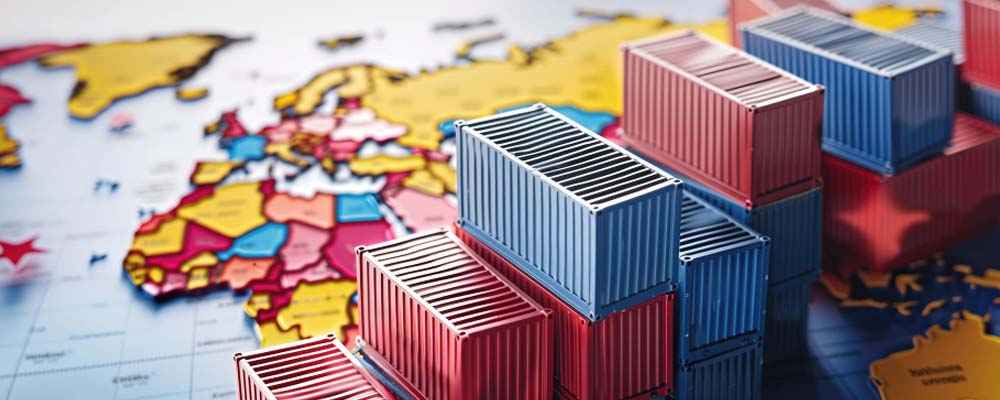
Exporting goods to Germany presents lucrative opportunities for freight forwarding companies, logistics providers, importers and exporters, customs brokers, manufacturers and producers, e-commerce businesses, and logistics vendors. Here’s everything you need to know to successfully tap into the German market.
Why Export to Germany?
Germany boasts the largest economy in the European Union and ranks as the fourth-largest globally. This makes it a prime target for businesses seeking to expand internationally. With a strong manufacturing sector and a consumer market with high purchasing power, exporting to Germany can significantly boost your revenue.
Germany’s strategic location in the heart of Europe also makes it a gateway to other European markets. Its efficient and extensive transportation infrastructure—from highways to seaports—facilitates smooth logistics operations.
Exporting to Germany also offers businesses the opportunity to diversify their markets, thereby reducing dependency on domestic demand. This can make your business more resilient to local economic fluctuations.
Understanding German Market Dynamics
Germany’s market is diverse, encompassing various industries such as automotive, machinery, chemicals, pharmaceuticals, and electronics. Understanding the specific demands and trends within these sectors is crucial for successful market entry.
The German market is also known for its high-quality standards and regulations. Businesses must be prepared to meet stringent quality requirements to gain acceptance and trust from German consumers and businesses.
The German consumer is both quality-conscious and price-sensitive. Therefore, offering high-quality products at competitive prices can give your business a significant edge in this market.
 Navigating Legal Requirements
Navigating Legal Requirements
When exporting to Germany, it’s essential to understand and comply with the country’s legal requirements. These include obtaining the necessary export licenses and permits, as well as complying with product-specific regulations.
Familiarize yourself with the European Union’s General Data Protection Regulation (GDPR), as it affects how businesses handle personal data. Non-compliance can result in hefty fines.
It’s also important to understand Germany’s customs procedures and import regulations. This includes knowing the Harmonized System (HS) codes for your products and ensuring accurate classification to avoid delays and penalties.
Building Strong Relationships
In Germany, business relationships are built on trust, reliability, and long-term commitment. Establishing a local presence, either through a partner or a representative office, can significantly enhance your credibility and facilitate smoother operations.
Networking is crucial in Germany’s business culture. Participating in industry trade fairs, exhibitions, and conferences can help you connect with potential partners, clients, and suppliers.
Effective communication is also key. Germans appreciate direct and clear communication. Ensure all your business correspondence is professional, concise, and free of jargon.
Leveraging Technology for Efficient Logistics
The logistics sector in Germany is highly advanced, with a strong emphasis on technology and innovation. Leveraging digital tools and platforms can help you streamline operations and improve efficiency.
Invest in a robust transportation management system (TMS) to optimize route planning, reduce transportation costs, and enhance visibility across your supply chain.
The Internet of Things (IoT) and real-time tracking solutions can provide valuable insights into shipment status, enabling you to proactively address any issues and ensure timely deliveries.
Customs Documentation and Procedures
Proper documentation is crucial for smooth customs clearance in Germany. Ensure all required documents, such as commercial invoices, packing lists, and certificates of origin, are accurately prepared and submitted.
Understanding the Import Control System (ICS) and the Automated Import System (AIS) can help expedite the customs clearance process. Familiarize yourself with these systems and their requirements to avoid delays and penalties.
Consider working with a customs broker who has expertise in German customs regulations. They can help you navigate the complexities of customs procedures and ensure compliance with all requirements.
 Managing Tariffs and Taxes
Managing Tariffs and Taxes
Germany, as part of the European Union, follows the EU’s Common Customs Tariff (CCT). Understanding the applicable tariffs and duties for your products is essential for accurate cost calculation and pricing.
Value-added tax (VAT) is another crucial aspect to consider. Ensure you understand the VAT rates and procedures for your products to avoid any compliance issues. Consider registering for VAT in Germany if your business activities require it.
Leveraging tariff classification tools and resources can help you accurately determine the applicable tariffs and duties for your products. This can help you avoid unexpected costs and ensure compliance with customs regulations.
Optimizing Supply Chain Management
Efficient supply chain management is crucial for successful exporting to Germany. Consider partnering with reliable logistics providers and freight forwarders who have experience in the German market.
Implementing inventory management systems can help you optimize stock levels, reduce carrying costs, and improve order fulfillment. These systems provide real-time visibility into inventory levels and help you make informed decisions.
Consider establishing distribution centers in strategic locations within Germany to enhance delivery speed and reduce transportation costs. This can also help you meet the expectations of German consumers for fast and reliable deliveries.
Ensuring Product Compliance
Germany has strict regulations and standards for various products, especially in industries such as automotive, electronics, and pharmaceuticals. Ensure your products comply with these regulations to avoid legal issues and gain acceptance in the market.
Consider obtaining relevant certifications and approvals, such as CE marking for certain products. These certifications demonstrate compliance with European safety, health, and environmental protection standards.
Conduct thorough testing and quality assurance processes to ensure your products meet the required standards. This can help you build trust with German consumers and businesses.
 Effective Marketing Strategies
Effective Marketing Strategies
Developing a strong marketing strategy is crucial for successful market entry in Germany. Consider adapting your marketing materials and messaging to align with the preferences and cultural nuances of German consumers.
Digital marketing can be particularly effective in reaching your target audience in Germany. Leverage social media platforms, search engine optimization (SEO), and content marketing to increase your online visibility and attract potential customers.
Consider collaborating with local influencers and industry experts to enhance your brand’s credibility and reach. Influencer marketing can help you build trust and connect with your target audience on a more personal level.
Providing Excellent Customer Service
Providing excellent customer service is essential for building long-term relationships with German consumers and businesses. Ensure your customer service team is knowledgeable, responsive, and capable of addressing any inquiries or issues promptly.
Consider offering multilingual customer support to cater to the diverse linguistic needs of German consumers. This can help you provide a more personalized and inclusive customer experience.
Implementing a robust customer relationship management (CRM) system can help you track customer interactions, preferences, and feedback. This can enable you to provide more tailored and effective customer service.
Sustainability and Corporate Responsibility
Sustainability and corporate responsibility are increasingly important factors for German consumers and businesses. Demonstrating your commitment to environmental and social responsibility can enhance your brand’s reputation and appeal.
Consider adopting sustainable practices in your supply chain, such as using eco-friendly packaging, reducing carbon emissions, and sourcing materials responsibly.
Communicate your sustainability efforts transparently to your customers and stakeholders. Highlighting your commitment to sustainability can help you build trust and loyalty among German consumers.
Navigating Challenges and Risks
Exporting to Germany comes with its own set of challenges and risks. Understanding and mitigating these risks can help you achieve long-term success in the market.
Economic fluctuations, regulatory changes, and geopolitical factors can impact your business operations in Germany. Stay informed about the latest developments and be prepared to adapt your strategies accordingly.
Building a risk management plan can help you identify potential risks and develop contingency measures. Consider working with risk management experts to ensure a comprehensive approach to risk mitigation.
 Conclusion
Conclusion
Exporting to Germany offers significant opportunities for businesses willing to invest in understanding the market dynamics, complying with regulations, and building strong relationships. By leveraging technology, optimizing supply chain management, and providing excellent customer service, you can successfully tap into the German market and achieve sustainable growth.
If you’re ready to take the next step in your exporting journey, consider partnering with experienced logistics providers and leveraging digital tools to streamline your operations. Invest in building strong relationships and demonstrating your commitment to quality, sustainability, and customer satisfaction.
Remember, exporting to Germany is not just about selling products; it’s about building trust, delivering value, and creating long-term success. Start your exporting journey to Germany today and unlock new opportunities for your business.




 Navigating Legal Requirements
Navigating Legal Requirements Managing Tariffs and Taxes
Managing Tariffs and Taxes Effective Marketing Strategies
Effective Marketing Strategies Conclusion
Conclusion



